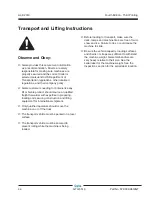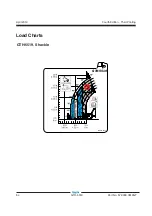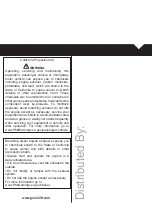
April 2019
54 GTH-5519 Part No.
57.0009.0619GT
Fourth Edition - Third Printing
Placing the Load
Ask a signal person to assist with placing the
load if visibility will be obstructed at the point of
operation.
Make sure that the signal person remains in
constant communication and be in visual contact
at all times with the operator.
Come to a complete stop near the landing point.
Set the parking brake and place the transmission
into neutral.
Slowly, and gradually, place the load over the
landing point and lower the load until it is safely
supported.
Once the load has been landed, continue to lower
the boom until the rigging and tethers can be
removed.
Signal Person (from 1926.1419)
Per OSHA CFR 1926.1419, a signal person is
required when:
The point of operation, meaning the load travel or
the area near or at load placement, is not in full
view of the operator.
When the equipment is traveling, the view in the
direction of travel is obstructed.
Due to site specific safety concerns, either
the operator or the person handling the load
determines that it is necessary.
Signal persons must remain in constant
communication (verbal or hand) and be in visual
contact with the operator at all times.
When using hand signals, follow the requirements
set forth in OSHA CFR 1926.1419-1926.1422.
The hand signal chart below may be used in place
of the Standard Method in Appendix A of Subpart
CC of Part OSHA CFR 1926.
Attachments


























